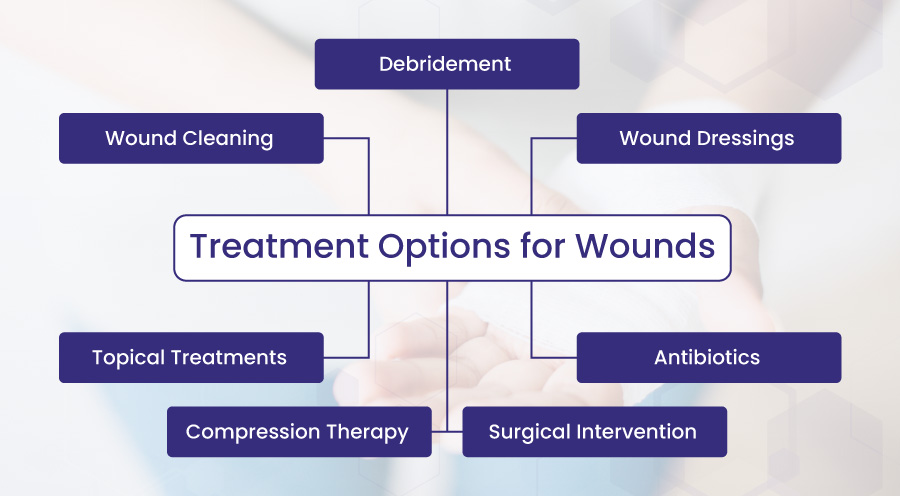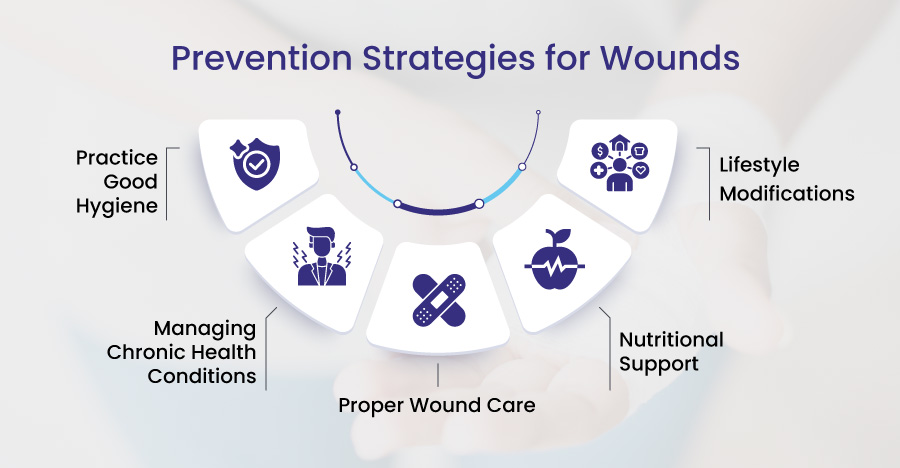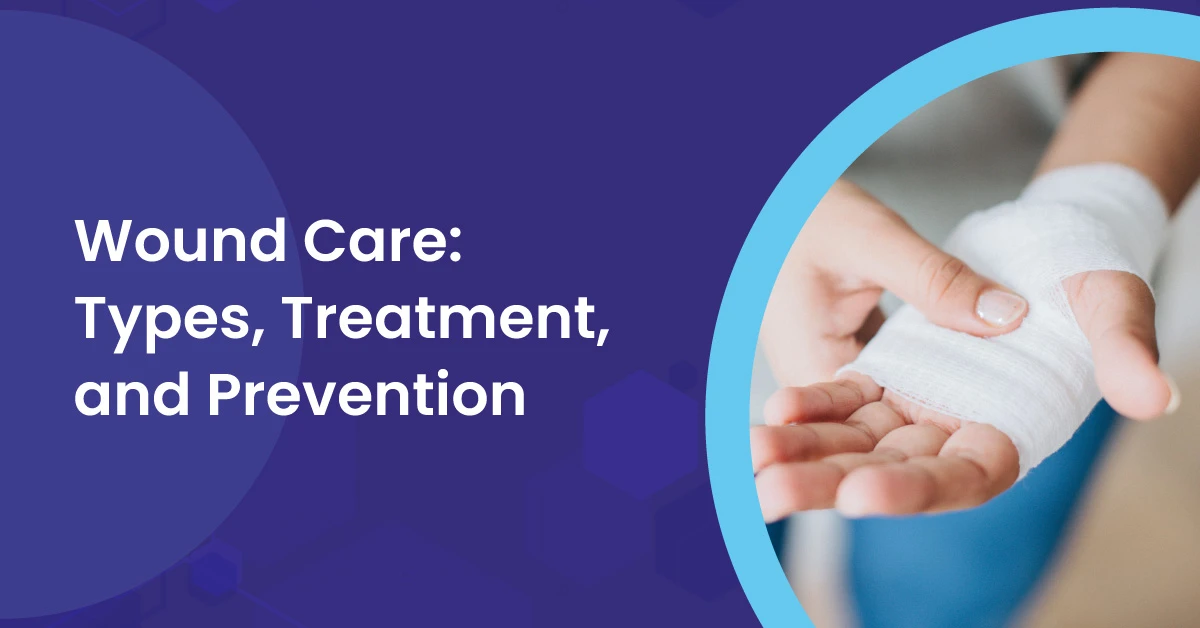Effective wound care is essential in medical facilities specializing in the treatment of wounds that require special handling, procedures, and advanced technology. The goal of wound care in such facilities is to prevent, treat, and manage wounds to promote healing and minimize complications.
Let’s discuss the different types of wounds, their causes, and the most effective treatment methods and prevention strategies available to promote optimal wound healing.
Types of Wounds
Open Wounds
The break in the skin that causes the underlying tissues or organs to be exposed to the external environment are open wounds. These types of wounds cause skin damage due to cuts by foreign objects such as gunshots, knife stabs, and explosive devices. Examples of open wounds are lacerations, burn wounds, punctures, incisions, etc.
Closed Wounds
Closed wounds do not expose the underlying tissues or organs nor do they damage the skin externally. In fact, they are caused by falls or direct but blunt blows. Closed wounds are blisters, contusions, crush injuries, Hematomas, etc.
Acute Wounds
Acute wounds have a rapid onset and short healing time and are caused by trauma resulting from cuts, lacerations, and puncture wounds. These types of wounds typically heal within a few days to a few weeks, but proper wound care is essential to prevent infection and promote optimal healing.
Chronic Wounds
Chronic wounds take a longer time to heal, usually around three months or longer, and are caused by underlying medical conditions such as diabetes, venous insufficiency, pressure ulcers, foreign debris, and antibiotic-resistant bacteria.
These types of wounds require ongoing management and monitoring to prevent infection and promote healing.
Surgical Wounds
Surgical wounds result from surgical procedures and require specialized care to prevent infection and promote healing. The risk of infection in surgical wounds is high because they are often made in areas of the body colonized by bacteria. Effective wound care is critical to prevent complications and promote optimal healing.
Causes of Wounds
Complex wounds can have various causes, including trauma, falls, blunt blows, medical conditions, and surgical procedures. Understanding the cause of the wound is crucial to providing appropriate care and promoting optimal healing.
Trauma
Trauma resulting from falls, car accidents, or sports injuries can cause complex wounds. These types of wounds can be difficult to treat as they often involve deep tissue damage and can be complicated by fractures or dislocations.
Medical Conditions
Medical conditions such as diabetes, peripheral artery disease, or venous insufficiency can impair wound healing and increase the risk of developing wounds. Patients with these conditions may also experience neuropathy, which can reduce their ability to feel pain and identify wounds, leading to delayed treatment.
Surgical Procedures
Surgical procedures such as open-heart surgery or joint replacement can result in surgical wounds that require specialized care. The risk of infection in surgical wounds is high because they are often made in areas of the body colonized by bacteria.
These types of wounds require close monitoring and specialized wound care to prevent complications.
Possible Complications of Wounds
Complications of complex wounds can increase your troubles both financial and personal. Although the complications of wounds are of numerous types, we have discussed here some of the most commonly possible complications of chronic wounds.
Infection
Wound infection is one of the top complications that obstruct the healing of an individual from possible redness, swelling, pus, pain, etc. For example, Tetanus can turn into one of the most deadly infections if not treated timely. Therefore, timely treatments are important in case of animal bites or contamination with dirt.
If a wound is not healing despite proper care and treatment, infection can be the most probable reason. The contamination with germs such as bacteria and viruses can lead to colonization resulting in systemic infection, organ dysfunction, or even life and limb-threatening conditions. Since these germs cannot be detected with the naked eye so they reach deep inside the body damaging the tissues and causing inflammation. Fever is also a form of infection.
The use of topical antimicrobials, debridement, and antiseptics are effective solutions to combat the possible complications of infection.
Diabetes
Diabetic patients are easily prone to infections. People with diabetes have lower blood flow and hence their infections heal quite slowly compared to normal people. The wound slowly gets red and swollen with pus cells and even a minor cut or blister can turn into an ulcer therefore prevention is always needed to avoid getting infections.
Pain
Another possible complication of a wound could be pain in the affected area. Pain is generally a part and parcel of a wound but at times pain is a prominent feature despite no apparent wound. In such cases, pain can be the diagnostic measure for an internal wound that is in its primary stage. Medical tests can help you diagnose the reason behind the pain.
Edema
Edema is another possible complication of a wound that can slow down the healing process. It can obstruct movement, cause stiffness and pain, ulcers, and breakdown of skin, increasing the chances of infection and preventing wound closure. Edema can further cause decreased blood flow increasing the chances of ulcers.
Necrosis and Gangrene
Wound complications might lead to necrosis and gangrene. In such conditions, the decreased blood flow causes arterial occlusion further leading to occlusion of vessels, ischemia, ulceration, and hence gangrene. There are two possibilities; the necrotic tissue is either dry or wet. If dry, it should not be disturbed. If wet, debridement can be considered to avoid further infection.
Scar Formation
Scar formation after a burn or minor injury can get complicated. Scar formation causes the skin and tissues to tighten making it difficult for the individual to move. Generally, scars fade, flatten, and are invisible but at times it’s otherwise. So if you find your scars troubling, you should go see your doctor or dermatologist.
Osteomyelitis
Another possible complication of the wound can be osteomyelitis. When the infection prolongs and reaches the surrounding tissues and bone it is called osteomyelitis and can result in swelling, pain, and inflammation. Patients with diabetes are more prone to this medical condition and they often had to face amputation or debridement of the affected tissue and bone before the arrival of antibiotics.

Treatment Options for Wounds
The type and severity of the wound determine the treatment options for complex wounds. Effective wound care involves a comprehensive understanding of the different treatment methods available to promote optimal healing.
Wound Cleaning
Wound cleaning is an essential part of complex wound care, as it helps remove debris and prevent infection. The wound should be cleaned with mild soap and water or saline solution.
Debridement
Removing the dead and infected tissues from the wound is called debridement. It enables you to remove germs, pus, or infectious cells, making the area clean and devoid of any infection using a scalpel or tweezers. Debridement is generally painful and requires you to numb the area before the treatment. The methods that are used for debridement are high-pressure water jets, enzymatic surgical, excisional, mechanical debridement, etc.
Wound Dressings
Wound dressings are used to protect the wound and promote healing. The appropriate dressing depends on the type and severity of the wound, as well as the amount of exudate (fluid) produced.
The purpose of wound dressing is to avoid it getting infected and draining excess fluid from the wound. The types of dressings that can be done on the wound are films, gauze, hydrogel dressings, hydrocolloid dressings, dressings containing silver or alginates, foam dressings, etc.
Topical Treatments
Topical treatments such as antimicrobial agents may be used to prevent infection. These treatments can be applied directly to the wound or incorporated into the dressing.
Compression Therapy
Compression therapy may be used to improve blood flow to the affected area and promote healing, especially in the lower legs. This method is particularly effective for treating venous ulcers.
Surgical Intervention
In severe cases, surgical intervention may be necessary to remove damaged tissue or address underlying medical conditions. Surgery may also be required to repair deep tissue damage resulting from trauma.
Antibiotics
Wounds that have been infected with bacteria or viruses have fewer chances to be treated without antibiotics. The type of antibiotics needed depends upon the severity of the wound which can be used in tablet or topical ointment form.

Prevention Strategies for Wounds
Prevention is a crucial aspect of complex wound care, and healthcare providers and practices should work with patients to develop prevention strategies that are tailored to their specific needs.
Practice Good Hygiene
Proper hygiene habits are the key to wound care. Hygiene includes washing or cleaning the area twice a day and changing the wound dressing with new bandage and ointment or antibiotics. Constant care and hygiene practice is important for quicker healing of the wound.
Managing Chronic Health Conditions
People with chronic health conditions need to make sure their health is fine and should manage their everyday lives according to that. For example, someone with diabetes can stay active to make sure they have their condition under control, and as soon as they feel any inconsistency they can consult their healthcare practitioner to nip any oncoming wound infection in the bud.
Proper Wound Care
Proper wound care is essential to prevent complex wounds from developing. This includes keeping the wound clean and dry, changing dressings regularly, and avoiding activities that could cause trauma to the wound.
Managing Underlying Medical Conditions: Managing underlying medical conditions such as diabetes or peripheral artery disease can reduce the risk of developing complex wounds. This may involve medication management, lifestyle modifications, or surgical interventions.
Nutritional Support
Adequate nutrition is critical for optimal wound healing. Patients should consume a balanced diet with adequate protein, vitamins, and minerals to support the healing process.
Lifestyle Modifications: Lifestyle modifications like quitting smoking and maintaining a healthy weight can reduce the risk of developing complex wounds. These changes can also improve overall health and reduce the risk of developing other medical conditions that could impair wound healing.
Conclusion
Effective wound care in medical facilities specializing in complex wounds requires prompt treatment, specialized care, and prevention strategies.
By understanding the different types of complex wounds, their causes, and the most effective treatment methods and prevention strategies available, healthcare providers can promote optimal wound healing and minimize complications




